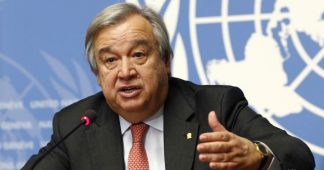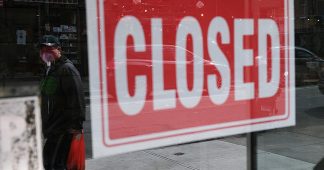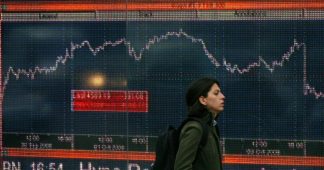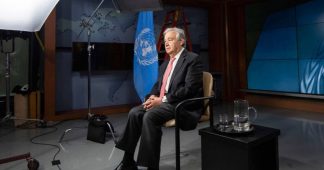The first in a seven-part, multi-week series of commentary on the COVID-19 crisis
By Radhika Desai
May 6, 2020
This is the first in a seven-part, multi-week series of commentary on the COVID-19 crisis entitled WHAT IS TO BE DONE? A MANIFESTO FOR POLITICS AMID THE PANDEMIC AND BEYOND by Radhika Desai, Professor of Political Studies and Director of the Geopolitical Economy Research Group at the University of Manitoba.
The COVID-19 pandemic appears to be peaking in the mostly Western countries worst affected so far, though it will continue to scythe down thousands for weeks to come. The virus could also return for a far worse second wave, and may yet break out on a large scale in more populous countries in the Third World, with unimaginable consequences.
Certainly, the lockdowns the pandemic has necessitated are unlikely to be lifted in their entirety anytime soon and, if they are, social and economic activity may still fail to return to the production and consumption levels and patterns of the recent neoliberal capitalist past. Though fatalities remain a fraction of the Spanish flu total, the public health emergency and the response to it have become profound political and economic crises of the neoliberal order, the only order of capitalism possible today, and thus a profound political crisis of capitalism itself, both domestic and international.
The Failure of Neoliberalism
There are two sure signs of this. Objectively, none of the handful of countries—China, Vietnam, Cuba, Venezuela and New Zealand—whose governments have been able to deal decisively and effectively with COVID-19 are what we might call ‘neoliberal’. They are either Communist or left governments that have distanced themselves from the social democratic neoliberalism that emerged in the 1990s under the likes of Tony Blair and Bill Clinton. These countries’ exceptional performance throws the deadly incompetence of neoliberal Western governments, led by the United States and the United Kingdom, into harsh relief.
In the Western core neoliberal countries, the severity of the pandemic and associated crises cannot be overstated. These governments, particularly those of its Anglo-American heartland, are caught in a scissor crisis: there is a widening gap between the mounting challenge and limited capacities—public health, governmental and political—whittled down by four decades of neoliberalism. This scissor has required nation-wide lockdowns of indeterminate length as the only way of limiting infections and fatalities. In turn, this has accelerated a long-overdue reckoning with the neoliberal order.
Though neoliberalism was billed as the sure-fire recipe for reviving growth when the West led the world in taking this route out of the crisis of the 1970s, it never did so. Rather than addressing it, Western states exacerbated the underlying demand problem while deregulation only benefitted finance. The resulting financialization of Western economies diverted resources towards speculation and away from productive investment.
These problems were already coming to a head, with acute observers predicting that an economic, rather than merely financial, crisis was looming, when the pandemic hit. There is, therefore, no pre-pandemic normal to return to. Neoliberal capitalism is certain to emerge from the present crisis transformed. There is, however, the question of how and by whom: by left forces in a progressive direction or by those of capital and the right in an even more miserly, punitive, Kafkaesque and authoritarian direction? That is what is politically at stake in the present moment. That is what this manifesto is about.
While the enhanced legitimacy of the non-neoliberal winners of the battle against COVID-19 will not last unless they keep new outbreaks limited, if not at bay, doing so requires them to repeat their recent feats on a smaller scale. It is true that they do face an increasingly uncooperative, indeed outright obstructive, international environment in which to do so. As with the US ceasing funding to the World Health Organization or the US and India blocking the issuance of new Special Drawing Rights, essentially international money, to aid the developing world, powerful rogue states are reducing, rather than increasing, their commitment to international institutions and efforts and even stooping to hijacking shipments of critical medical supplies on the high seas. However, such antics will likely accelerate the trend, evidenced most notably by Italy, to break neoliberal ranks in accepting help from China and even Russia and Cuba, and resisting the unrelenting attacks on China that emanate particularly from the bastions of neoliberalism, the US and the UK.
There Is an Alternative, There Always Was
Those attacks are the second unmistakable sign of the political crisis of neoliberal capitalism. It is clear to its masters that the demonstration effect of China’s successful response to COVID-19 poses a great threat to their own legitimacy, not least because it is only the latest of such demonstration effects. Others include raising more millions out of poverty than any government in history, responding effectively to the 2008 crisis, whose effects still linger in the neoliberal West, and taking international financial and investment initiatives that are making or enabling much-needed productive investment in the Third World, to take just three of the more prominent examples.
All of them cast unflattering light on the neoliberal West. When former UK Prime Minister Margaret Thatcher proclaimed that ‘There is no alternative’ to ‘free market’ and ‘free trade’ neoliberalism, she was dispatching the statist arrangements of the Western post-war Keynesian welfare state to the proverbial dustbin of history. However, after the Soviet Union disintegrated, the slogan acquired an even greater resonance. With the USSR gone, and China appearing to turn towards markets, neoliberal capitalism had, it appeared, won the day and vanquished its mortal enemy, Communism. However, the actually existing Communisms that had begun emerging in the twentieth century, starting with the Russian Revolution, were not some bolt from the blue. Their rise was deeply connected to the effect of capitalist development in some countries on others.
As the powerful capitalist countries subordinated or threatened to subordinate, other countries, many succumbed. Others, however, were not only willing but able to resist subordination and seek alternative paths, and even goals, of development. There was never any guarantee that such attempts would succeed, nor that their elites would not, as the Soviet elite did, throw in the towel after astonishing achievements, including the Soviet Union’s indispensable contribution to Allied victory in the Second World War and its ability to transform backward economies and societies into materially prosperous and culturally sophisticated rivals of the West. The only guarantee is that the nature and contradictions of capitalism, which impel it toward imperialism, ensure that its geopolitical economy will never be free of such attempts. There is a reason why the Russian Revolution was followed by a long line of such resistance to imperialist capitalism.
Moreover, like capitalism, actually existing communism also has its own history and political leaders capable of learning from it. Certainly the leadership of the Communist Party of China learned much from the fate of Russia and of the countries of Eastern Europe after the end of Communism there. ‘Shock therapy’ imposed by Western powers and their associates on the Soviet Union and the Eastern Bloc destroyed productive capacities and social and political institutions wholesale and even led to steep declines in life expectancy, something not witnessed in peacetime. By the time its work was done, the former Communist world, which had hitherto afforded its citizens a high standard of living, were reduced to a periphery or labour reserve for Western Europe’s industrial core if they had joined the European Union or, in the case of Russia, Ukraine and others, became the semi-periphery or periphery of the world economy.
Any reasonably competent leadership would seek to avoid that fate and, so far, at least, the leadership of the Chinese party-state has demonstrated such wisdom. Though considerable market reforms have been undertaken, China remains a planned economy and one in which its capitalists, though very rich and numerous, do not (yet?) hold the reins of state power. Though it acceded to the World Trade Organization, China has not ‘converged’ with the West as it hoped for the simple reason that such convergence would have brought subordination of the sort suffered by the former Communist countries of Europe and the post-Soviet space. Instead, China traded and exchanged financial flows with the world on its own terms and planned its way to its present relative prosperity, thereby picking up the torch of demonstrating that there is an alternative from where the former USSR had so fatefully dropped it.
Communism therefore lives, and threatens capitalism. It does not threaten with its guns. Like the former Soviet Union and even Russia today, China’s security posture is defensive, while that of the capitalist world, aggressive and offensive. The threat lies in its demonstrably superior economic performance. This was already becoming clear in the new century, when Jim O’Neill, a Goldman Sachs economist, made the prediction that the world’s economic centre of gravity was shifting away from the West. It became all the more so after 2008, when the BRICs (the acronym referred to the four major emerging national economies O’Neill focused on) avoided the slowdown in growth that plagued the neoliberal West and continued their growth, with Communist China far in the van because its policies were farthest from neoliberalism. That is not the least reason why there is a New Cold War against Russia that refuses complete subordination to the West and against China. Of course, it also extends to the renewed and intensified hostility towards Cuba and towards Venezuela, which has committed the added crime of sitting on vast mineral wealth that Western capitalists slaver over.
Thus the increasingly sharp attacks on China, questioning its achievements by any means at hand, attributing the success of its coronavirus response to its ‘authoritarianism’ (while overlooking the real authoritarianism of the fascist Indian government’s response, and even praising it). Vicious as they are, such attacks may not be having their intended effect. Despite them, and the long-standing legacy of anti-communism in the US and the West, substantial minorities among Western publics languishing under over a decade of austerity, have favourable views of China.
China’s response to the novel coronavirus has the potential to further burnish its reputation in the West. In addition, the shift of the world economy’s centre of gravity away from the West, something that is feared by neoliberal leaders, but welcomed by others, has accelerated. The neoliberal West’s offensives, rhetorical and military, are at once desperate and dangerous.
The Grounds for Political Hope
These developments have given rise to unprecedented political hope for progressive change, particularly in the West where the pandemic presently centres. There are several grounds for it. Certainly, awareness of long-simmering issues in nearly all spheres of society is coming to a boil. The problems of our health systems—uneven access, inadequacy of services hollowed out by contracting out to private providers, low pay and short staffing, rising expenses of services, drugs and medical—have moved from the agendas of small campaigns to the centre of political debate, as has the scandal of elder care.
The disproportionate COVID-19 fatalities among the poor and the non-white is exposing the structural racism of our societies. The fragility of the productive systems of the world’s richest countries are revealed when, with supply lines splayed precariously around the globe by the drive to squeeze the last cent of profit, they prove unable to supply critically needed products. The complete irrationality of rising income inequality stands exposed when it turns out that the most essential of workers are also the most marginalised and low paid women and minorities. While the well-to-do seek to self-isolate in luxurious conviviality, and the middle classes discuss the joys of a slower rhythm of life with yoga and baking, homelessness and crowded homes have made nonsense of ‘self-isolation’, while domestic abuse, itself in good part a structural feature of the pressures created by steep neoliberal hierarchies, has brought out its often macabre character. While middle class parents discuss the techniques of home schooling and report on the bandwidth wars at home, their children pull farther ahead of poor children without internet access or devices. Such exposées are minting more radicals.
The pandemic has also made us all better informed. Readership of the news is at an all time high. Intellectuals across nearly the entire political spectrum appear to be outdoing one another in proposing to rectify this or that ill, sure in the knowledge that concerned publics, worn down by decades of neoliberal damage—suddenly acutely aware of it—will only lap it all up. Modern Monetary Theory, which argues that, contrary to former British Prime Minister Theresa May’s claim that ‘there is no magic money tree’, there is and that public authorities have harvested its fruit and leaves to bail out banks and can do so to finance government expenditure for popular purposes, is making the rounds. Universal Basic Income is an idea whose time has come.
Most on the left feel vindicated as the pandemic and the economic crisis force dyed-in-the-wool neoliberal governments to make previously unimaginable policy U-turns—aggressive fiscal activism, effective monetization of government debt, income support, requisitioning and even nationalising of private property, requiring private enterprises to cooperate in the production of essential medical equipment and drugs, the list is long. It is an indication of the severity of these measures, and the extent of the departure from neoliberal rules that neoliberal observers and politicians have taken to comparing the present emergency to the Second World War. Their motive, other than posing as Churchillian war leaders, is to indicate, wishfully as we shall see, that these measures are exceptional and should not be expected to continue after the public health emergency is over.
However, if that is what they wish, they are clearly playing with fire. The analogy is easily charged with the opposite political valence. Extensive and intensive government control of economies during the Second World War was as critical to victory externally as to ensuring ‘fair shares and equal sacrifices’ at home. The latter was so effective that the well-being and even life expectancy of ordinary citizens actually rose during wartime. After the war, a broad agreement emerged that if government intervention and planning could win wars, it should now be put to work curing social ills and guarding against any relapse into depression conditions. There could be “no excuse anymore for unemployment, slums and underfeeding.”
While the UK was the paradigmatic example of this development, government intervention created more equal, more fully employed and more productive economies around the world. Then, as now, actually existing communism provided the model. As one of the foremost historians of the modern world, Eric Hobsbawm, pointed out in his history of The Short Twentieth Century,
…the politicians, officials and even many of the businessmen of the post-war West [were convinced that]… a return to laissez-faire and the unreconstructed free market were out of the question. Certain policy objectives—full employment, the containment of communism, the modernization of lagging or declining or ruined economies—had absolute priority and justified the strongest government presence. Even regimes dedicated to economic and political liberalism now could, and had to, run their economies in ways which would once have been rejected as ‘socialist’.
The increased government activism amid the present crisis can surely only repeat this experience, we think wistfully. We also remember that while our politicians may invoke the Second World War to indulge in Churchillian grand-standing, he and his Conservative Party were, in fact, defeated by the ‘modest’ and ‘mouse-like’ Clement Atlee and his Labour Party in the historic 1945 General Election.
These possibilities are, moreover, being reinforced by new realizations and solidarities. The decades of environmental activism is bearing fruit in driving home the message that the pandemic is not some exogenous shock, but the result of decades of rapacious exploitation of the land narrowing wildlife habitats combined with cruel factory farming of animals. The cleaner air, bolder wildlife and louder birdsong are making people aware that if the economy can be slowed down to rescue us from a virus, surely it can also slow down to rescue us from the still-looming climate crisis. The lockdowns, more and less severe, that are breaking habits of decades seem set to reverse the consumerism, individualism and egotism heightened by neoliberalism.
‘We are all in this together’ feelings are widely shared and awaken long-neglected solidarities. Many are joining new struggles: over incomes, rent, debt or any of the myriad issues that are opening up fissures across society. Many more are realising that neglecting the health and well-being of a section of society, or of the world, is not without consequences for the rest of them and that redressing that neglect will involve action on not only the medical front but also the economic. Moreover, the relative simplicity enforced on the well-to-do by the lockdowns are leading them to discover new joys in it. They are rethinking what life is about: Ever more mindless consumption of unnecessary things that rely on keeping vast swaths of the world’s workforce in poverty? Or advancing civilization and developing human capacities at home and abroad in meaningful ways now that a modicum of prosperity has become technologically feasible for all? New priorities are surely emerging.
The Path to Realising the Political Hope
Left and progressive forces seeking to realise this new political hope face obstacles and dangers of being led astray, however. On the one hand, there are the left’s own longstanding limitations, intensified in the neoliberal era. Objectively, the strength of labour and other popular forces is diminished. Subjectively, too, the left has ebbed, reacting to the neoliberal assault with de-radicalization rather than radicalization. In particular, its understanding of actually existing communism and the historical record of revolutions against capitalist imperialism so far weakened during the neoliberal period. This also worked to the detriment, as we shall see, of its ability think about how to organise production (as opposed to redistribution) in socialist economies. This subjective weakening also clouds many left minds on contemporary China and thus on what a viable internationalism must consist of today.
On the other hand, progressive forces face a metropolitan capitalist class and a political right which may be facing its most profound crisis ever, but is not without recourse, including state, military, intelligence, media and public relations apparatuses, not to mention a long and so far successful history of ‘permanent counterrevolution’. As we shall see, it is working in the present crisis to put the Humpty Dumpty of neoliberalism back together by managing a transition to yet another phase of neoliberal capitalism (there have been at least four so far, as we shall see), what I call pseudo-philanthropic neoliberalism.
If the analysis presented here holds, the forces of capital and the right are unlikely to succeed. However, they will certainly complicate and endanger any pursuit of left objectives and hopes. It could hang on to power by authoritarian means, supplemented, as they must inevitably be in advanced capitalist societies, by vigilante forces of order, returning us to the point of choice between fascism and socialism that Karl Polanyi long ago posed and is yet to be overcome. Or it could lead to a frightening level of social, economic and political breakdown and chaos, what Karl Marx called the common ruin of the contending classes. Rosa Luxemburg called it ‘barbarism’. A sober consideration of this situation reveals that we need to think less in terms of opportunities for the left and more in terms of its responsibilities in leading humanity away from these frightening prospects and towards socialism.
This manifesto seeks to orient left and progressive forces on this complex terrain of the current crisis conjuncture. The forces it addresses are defined broadly with the understanding that their ranks are being swelled as the crisis reorients thinking and practices and that many old divisions can be overcome among those assuming our urgent responsibility.
This manifesto seeks to map the domestic and the international terrain on which the left must advance today. Since there are few unified left forces anywhere, it seeks to enable left parties, movements and groups to reinforce each other’s efforts and effectiveness by proposing a framework into which their diverse and discrete struggles can fit and which can give them a wider understanding of our purposes and struggles. It also maps the terrain on which the forces of capital and the right are organising and fighting and the strategies they are using.
The battle lines must be drawn around the false choice they offer us between lives and livelihoods, where the latter is equated with preserving the neoliberal order. This choice must be refused. To do so, any left strategy must clearly distinguish between what must be done to preserve both lives and livelihoods in the emergency and in the reconstructed economy beyond.
* Radhika Desai is a professor in the Department of Political Studies at the University of Manitoba and currently serves as the director of the Geopolitical Economy Research Group.











